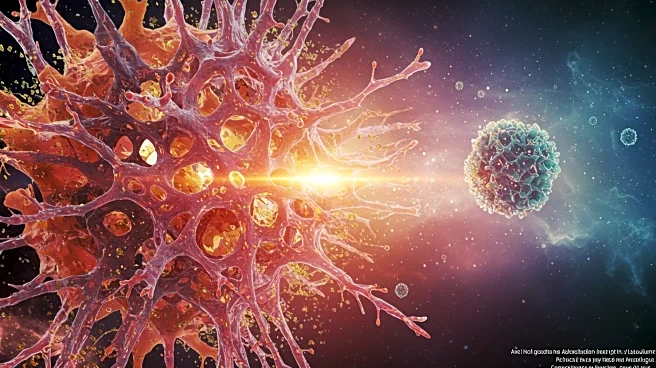What is the story about?
What's Happening?
Researchers at the University of Chicago Pritzker School of Molecular Engineering have successfully transformed a protein found in living cells into a functioning quantum bit, or qubit. This development marks a significant advancement in quantum technology, as the protein qubit can serve as a quantum sensor capable of detecting minute changes within biological systems. The research, published in Nature, highlights the potential of using biological systems themselves to develop quantum sensors, rather than adapting conventional quantum sensors for biological environments. This approach leverages the natural properties of proteins, allowing them to be produced by cells with atomic precision and detect signals much stronger than existing quantum sensors. The protein qubits could revolutionize quantum-enabled nanoscale MRI and provide unprecedented insights into cellular machinery.
Why It's Important?
The creation of protein-based qubits represents a groundbreaking shift in both quantum technology and biological research. By enabling quantum sensing within living systems, researchers can directly measure quantum properties at the nanoscale, offering new ways to study biological processes such as protein folding and enzyme activity. This innovation could lead to early detection of diseases and transform the understanding of biological systems at the quantum level. Furthermore, the ability to genetically encode these qubits into living organisms opens up possibilities for advancing quantum technology itself, using nature's tools of evolution and self-assembly to overcome current limitations in spin-based quantum technology.
What's Next?
The protein-based qubits, while not yet matching the sensitivity of current quantum sensors made from diamond defects, promise radical advancements in biological research. Future studies may explore the application of these qubits across various classes of proteins and systems, potentially leading to new discoveries in quantum biology. Researchers anticipate that the boundary between quantum physics and biology will continue to dissolve, paving the way for transformative scientific breakthroughs. The ongoing development of these qubits could also inspire new approaches to designing quantum materials, further integrating quantum technology into biological research.
Beyond the Headlines
This interdisciplinary research highlights the ethical and scientific implications of merging quantum technology with biological systems. The ability to observe biological processes at the quantum level raises questions about privacy and the potential for manipulating biological functions. Additionally, the integration of quantum sensors into living organisms could lead to long-term shifts in medical diagnostics and treatment, offering new avenues for personalized medicine and disease prevention.

















